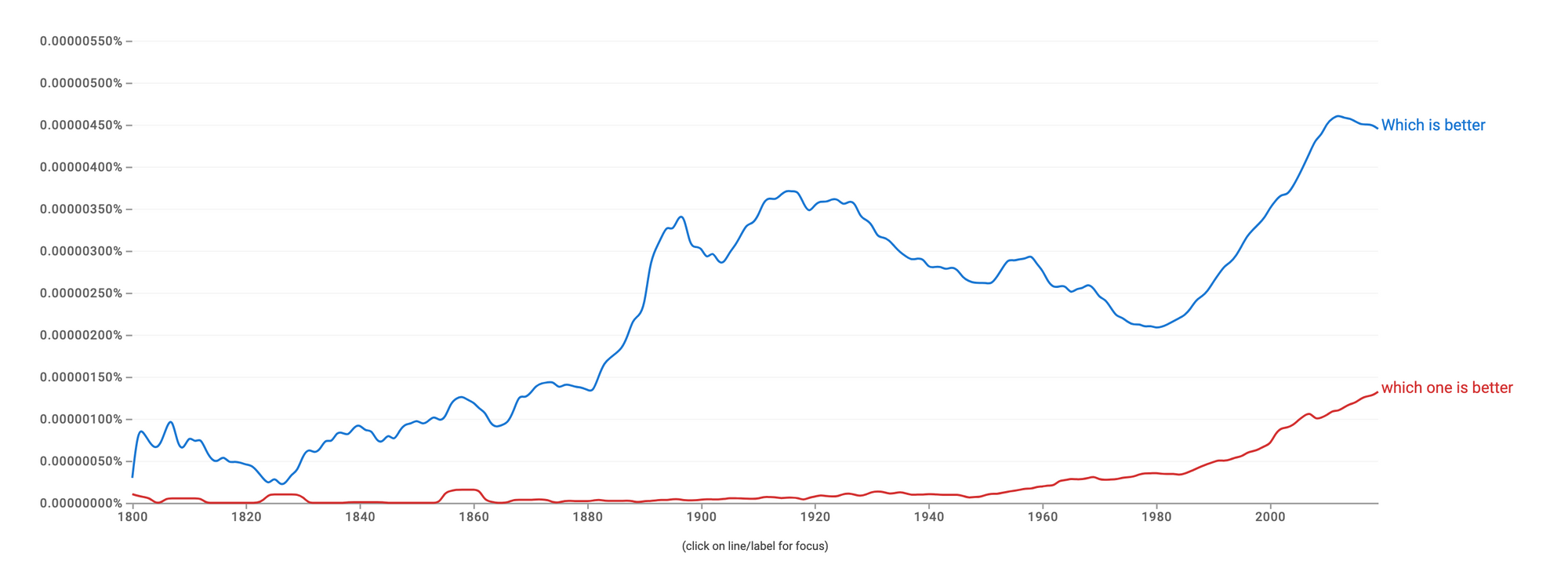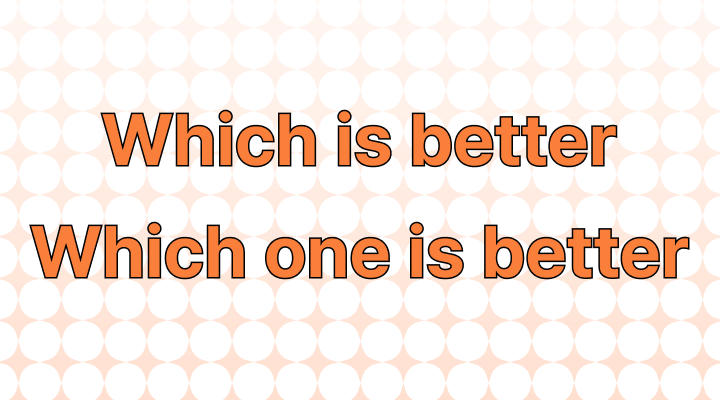- "Which is better": This phrase is more general and can be used when comparing categories, concepts, or broad ideas.
- "Which one is better": This phrase is more specific and is employed when comparing individual items or specific instances within a category.
Example sentences
- "When deciding between a beach vacation and a mountain retreat, which is better for relaxation?"
- "Considering these two smartphones, which one is better in terms of camera quality?"
"Which is better" and "Which one is better" both aim to inquire about the superior option among two or more choices. However, the distinction lies in their usage and the context in which they are employed.
In terms of use, "which is better" is used in higher frequency than "which one is better." This might be because the phrase is easier to say/write than "which one is better" as it is shorter.

Guidelines for Usage:
Understanding when to use each phrase is essential for clear communication. Here are some guidelines to help you navigate the terrain of choices:
Use "Which is better" for broader comparisons:
- When contrasting general concepts or categories, opt for "Which is better."
"Which is better" is typically located at the beginning of a sentence when posing a question or initiating a comparison. It sets the stage for the reader or listener to consider two or more options and make a choice.
Starting a Question:
- "Which is better for a weekend getaway, a cozy cabin in the mountains or a beachfront cottage?"
Introducing a Comparison:
- "When evaluating job opportunities, which is better in terms of work-life balance: a remote position or a traditional office job?"
Prompting a Decision:
- "You're redecorating your living room, and you have two color schemes in mind. Which is better for creating a warm and inviting atmosphere?"
Initiating a Debate:
- "In the ongoing discussion about renewable energy sources, which is better for long-term sustainability: solar power or wind energy?"
Comparing Lifestyle Choices:
- "Considering your fitness goals, which is better for overall health: a high-intensity interval training (HIIT) routine or regular cardiovascular exercises?"
By placing "Which is better" at the beginning of the sentence, you make it clear that a comparison is being made, and the reader or listener is prompted to consider and choose between the options presented.
Examples from the web
"Which is better, ownership or sharing?" - The New York Times
"Which is better: storage software or hardware?" - The New York Times
The phrase "which is better known as" is slightly different from "which is better" as it is used to introduce an alternative or more familiar name or term for something rather than to initating a comparison. It is a way of providing additional information or clarification, especially when referring to a less common or widely recognized term.
✍️ "The Big Dipper, which is better known as Ursa Major, is a prominent constellation in the northern hemisphere."
✍️ "He founded the company under the name Backrub, which is better known as Google today."
✍️ "The actor's real name is Caryn Johnson, which is better known as Whoopi Goldberg in the entertainment industry."
Use "Which one is better" for specific choices:
- When comparing specific items or instances, choose "Which one is better" for precision.
- Example: "Between these two job offers, which one is better suited to your career goals?"
Like "which is better" "which one is better" is typically located at the beginning or near the beginning of a sentence when posing a specific question about a choice between two or more individual items or instances.
Starting a Specific Comparison:
- "Which one is better in terms of camera quality, the latest iPhone or the newest Android model?"
Introducing Specific Choices:
- "You've sampled two dishes at the new restaurant. Which one is better: the spicy curry or the grilled salmon?"
Prompting a Decision between Options:
- "You're considering two job offers. Which one is better suited to your career goals and personal preferences?"
Comparing Specific Features:
- "You're shopping for a new laptop. Among these options, which one is better in terms of processing speed and storage capacity?"
Questioning Personal Preferences:
- "You're looking for a new hobby. Which one is better for relaxation and creativity: painting or gardening?"
In these examples, "Which one is better" initiates a focused inquiry into the specific qualities or attributes of individual items or choices, prompting the reader or listener to consider and compare those specific elements.
Examples from the web
"Everybody has an opinion on which one is better, but the reality is that you're getting a very similar product." - The Guardian - Sport
"But, in the context of receiving medical treatment it seems initially bizarre that decisions will be made based on the flip of a coin given that there is an alternative and ostensibly better approach: assign treatments based on clinical judgment regarding which one is better for the individual in question." - SEP
"Why are you and your sister dressed differently today?" or "Which one is better than the other?" are things either one of you or both may hear." - WikiHow
Conclusion
In the realm of choices, language plays a pivotal role in articulating our preferences. Whether you opt for the broader "Which is better" or the more specific "Which one is better," clarity in expression ensures effective communication. So, the next time you find yourself at a crossroads of choices, choose your words wisely to navigate the path to the better option.
Want to sound like a native speaker?
Engram’s AI-powered grammar checker makes your English sound like a native speaker’s, suggesting natural English expressions on top of fixing grammar, spelling, punctuation, word order, and vocabulary.

References:













